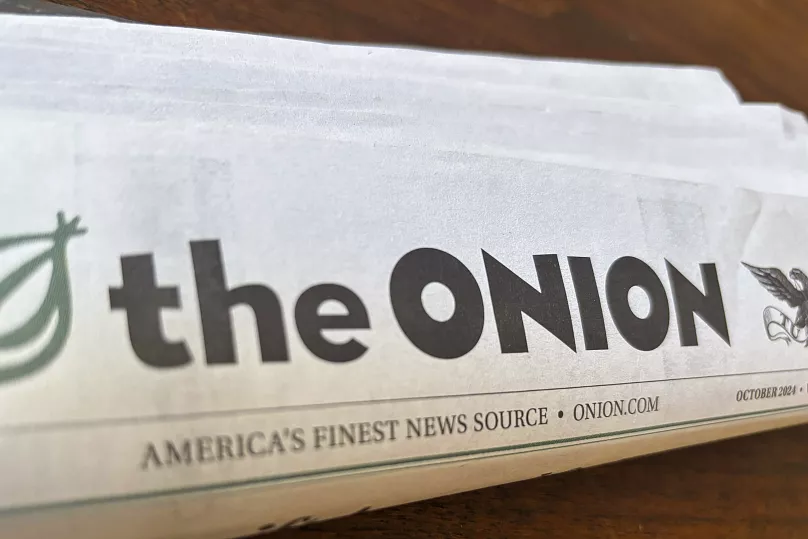The Onion’s ambitious plan to acquire and transform Infowars has hit an unexpected legal roadblock, as a bankruptcy judge raised serious concerns about the auction process. The development adds another layer of complexity to what was already shaping up to be one of the most unusual media acquisitions in recent memory.
The announcement on Thursday by The Onion’s parent company, Global Tetrahedron, initially sparked widespread attention for its audacious plan to convert the controversial Infowars platform into what they described as “a very funny, very stupid website.” However, U.S. Bankruptcy Judge Christopher Lopez quickly pumped the brakes on the celebration, calling for an evidentiary hearing to scrutinize the auction proceedings that led to this unprecedented sale.
The proposed acquisition carries particular weight given Infowars’ notorious history, especially its founder Alex Jones‘s liability for nearly $1.5 billion in damages for spreading conspiracy theories about the 2012 Sandy Hook Elementary School shooting. In a poignant detail that underscores the gravity of this transition, The Onion reportedly secured the blessing of Sandy Hook victims’ families for the purchase, with Everytown for Gun Safety, a nonprofit established in the wake of the massacre, expressing interest in advertising on the reformed platform.
The complexity of the sale became apparent during court proceedings when Christopher Murray, the trustee overseeing the auction, revealed that Global Tetrahedron’s bid wasn’t actually the highest in cash terms. The competing bid from First United American Companies, which currently operates a website selling Jones’s supplements, had offered $3.5 million. However, Murray defended selecting The Onion’s parent company’s lower bid, citing a unique arrangement where some Sandy Hook families agreed to forgo their portion of the proceeds to benefit Jones’s other creditors.
Judge Lopez’s intervention stems from concerns about the auction’s transparency and fairness. First United’s attorney alleged that the trustee had altered the auction process days before completion, eliminating a final round of bidding that would have allowed parties to outbid each other. While Murray maintained that his actions aligned with the judge’s September auction rules, characterizing the final round as optional, Lopez’s skepticism was evident in his stern declaration that “no one should feel comfortable with the results of this auction.”
The Onion’s announcement of the purchase showcased their characteristic satirical flair, blending truth and absurdity in their description of Infowars as “an invaluable tool for brainwashing and controlling the masses.” Their statement cleverly skewered the platform’s legacy of “delusional paranoia and dubious anti-aging nutrition hacks,” while noting its peculiar ability to simultaneously champion billionaires while fostering distrust in government institutions.
Behind the satirical facade, the acquisition represents a serious attempt to transform a platform that caused real harm into something constructive. Ben Collins, Global Tetrahedron’s CEO and former NBC News journalist who extensively covered Infowars’ misinformation campaigns, envisions launching the revamped site in January. The plan, according to The New York Times, involves recreating Infowars as a parody of itself and other “weird internet personalities” like Jones.
The situation becomes even more intriguing considering recent developments in the broader media landscape, including Elon Musk’s controversial decision to reinstate Jones on X (formerly Twitter) last year, after the platform had “permanently” banned him in 2018. This context adds another layer to the ongoing discourse about content moderation, misinformation, and the role of satire in contemporary media.
The judge’s decision to schedule an evidentiary hearing for next week has created uncertainty around what could have been a watershed moment in digital media. The outcome will not only determine the fate of a notorious platform but could also set precedents for how bankruptcy courts handle similar cases where public interest and commercial considerations intersect.
The potential transformation of Infowars from a platform that spread harmful conspiracy theories to one dedicated to satirizing such content represents a unique approach to addressing the challenge of online misinformation. If approved, this acquisition would mark an unprecedented attempt to repurpose a controversial media platform for constructive purposes, with the backing of those most affected by its former incarnation.
As the media world awaits next week’s hearing, the situation serves as a reminder of the complex interplay between satire and reality in our current media landscape. The Onion’s attempt to purchase Infowars, regardless of its ultimate outcome, highlights how the boundaries between serious news, misinformation, and satire have become increasingly blurred in the digital age.
The pending review of this unusual media acquisition underscores the challenges of balancing legal procedures with creative solutions to address the aftermath of harmful misinformation. Whether The Onion ultimately succeeds in its bid to transform Infowars into a platform for constructive satire remains to be seen, but the attempt itself has already made history in the evolving landscape of digital media.
















Add Comment